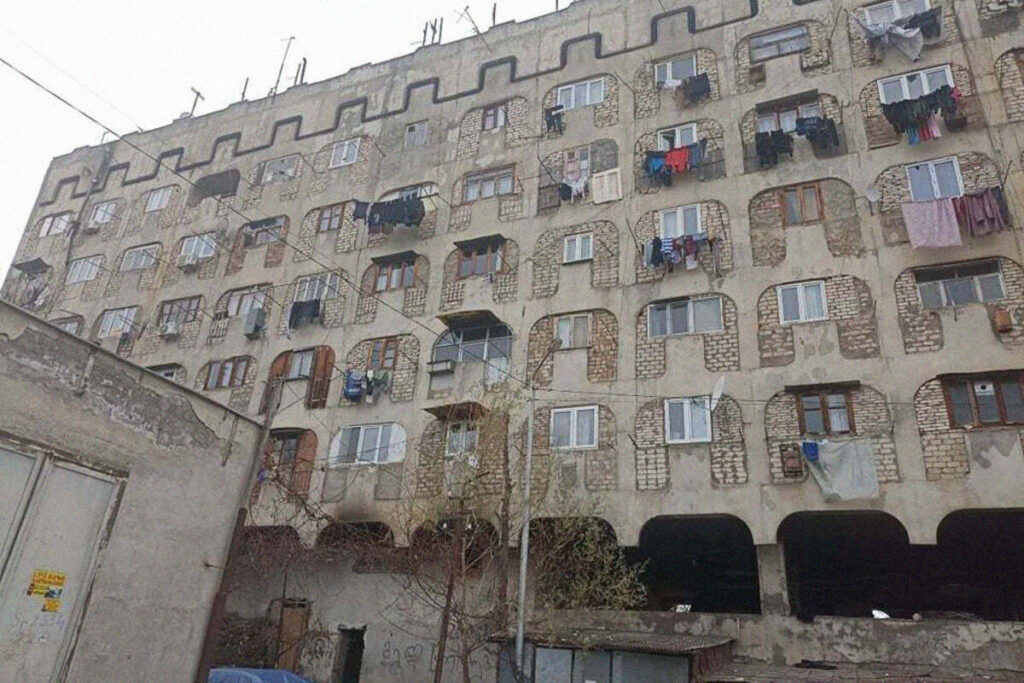Neighbours of a man who allegedly jumped from the roof of the building in which he resided have condemned what they labelled government spin over his death, accusing them of disrespecting him.
Zurab Chichoshvili, an internally displaced person (IDP) in his early 50s, fell from the roof of a former sanatorium housing IDPs on Sunday evening, dying instantly. The incident happened amidst demands from him and other residents of the building for alternative housing.
Neighbours immediately gathered near his body, lying on the ground, before being cleared from the scene by police.
Residents of the building have insisted that Chichoshvili took his own life in despair amidst the ongoing protests, while the government have claimed his death was an accident.
The incident is currently being investigated.
IDPs living in the former Sanatorium Kartli, near Tbilisi Sea, have been demanding help from the government as they describe their current place of residence as unlivable.
The old building, constructed during the Soviet Union, looks visibly dilapidated, and residents have claimed that with cracks multiplying recently, the building poses a danger to their lives.

On Monday, the Georgian Minister for IDPs, Zurab Azarashvili, urged people not to connect Chichoshvili’s death with their housing problems, stating that ‘according to preliminary findings’, it was the result of an accident.
His plea angered residents of the former sanatorium further. A group of them organised a press conference in the building later on Monday and described the minister’s statement as a ‘shameful’ and ‘immoral’ attempt to hide the reason behind Chichoshvili’s death.
‘Mister Minister… people die in this country due to neglect, hopelessness, and despair. This was exactly what caused this tragedy and you will not escape responsiblity’, they said in a statement.
‘No conditions’ following the tragedy
Despite attempting to separate Chichoshvili’s death from the housing issue, within hours of the incident on 16 January, the ministry for IDPs vowed to provide residents of the former Sanatorium Kartli with new housing in 2022 ‘without any preconditions’.
The authorities had previously responded to protests by residents since late December with several offers for rehousing.
The government had offered to pay for flats costing up to $550 per square metre, with the size dependent on the number of members of the household.
They were also offered to wait for new residential buildings to be built with an option to move elsewhere in the meantime, with their rent to be covered by the municipal or central authorities.
However, residents have claimed that the price cap was too low and that they did not trust the government to continue paying their rent until they were permanently rehomed, demanding immediate relocation instead.
Distrust among the residents was also exacerbated by a need to qualify as an IDP in ‘urgent need’ for alternative housing, defined by a special commission.
A decades-old problem
According to the Ministry for IDPs, Tbilisi hosts nearly 112,000 people displaced by the conflicts in Abkhazia and South Ossetia, predominantly during the early 1990s and in 2008.
The government have repeatedly come under fire for their failure to ensure adequate housing for IDPs dispersed throughout the territory under Georgia’s control.
Criticism over their living conditions often erupts after specific incidents or protests before being overshadowed by new political developments.
Over the three decades since the first IDPs fled their homes, protests have included street rallies, threats to move back to Abkhazia and South Ossetia in protest, hunger strikes, and even attempts at self-immolation.
In addition to building new residential buildings and buying houses and flats, the current government has aimed to address the housing problems of IDPs in recent years by developing ‘village-type settlements’ for them.




 17 January 2022
17 January 2022



